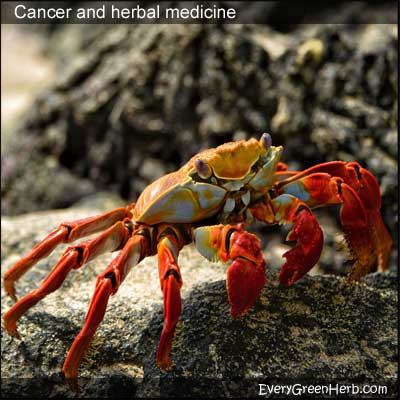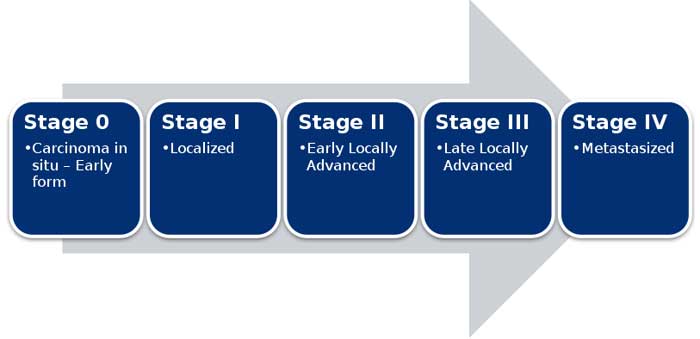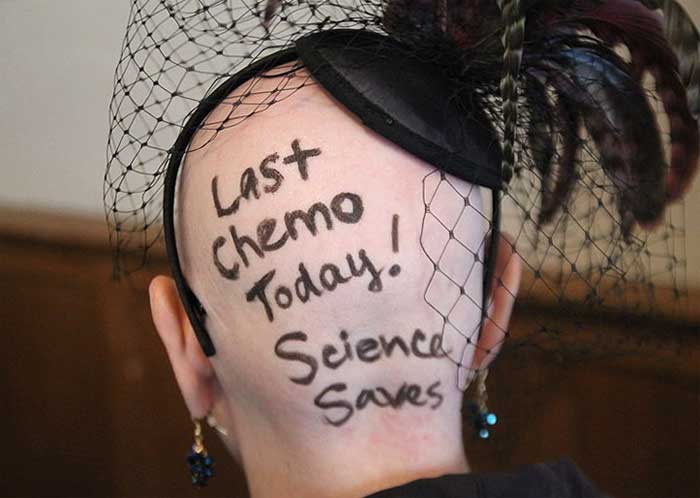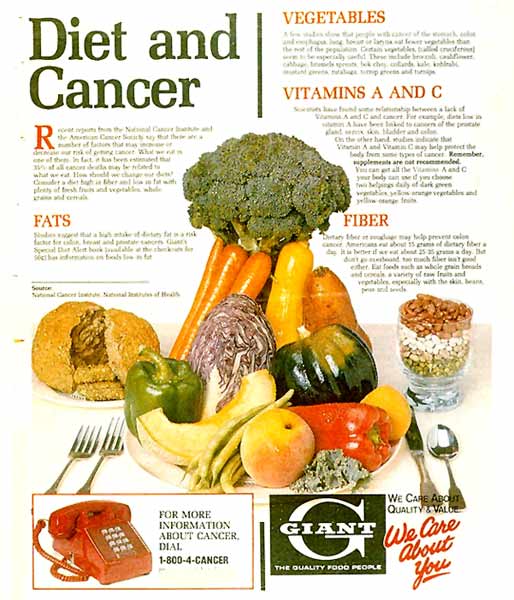Cancer and herbal medicine
Cancer is defined as uncontrolled, abnormal cell division in our bodies caused by genetic mutations.

There are many types of cancers including carcinoma, melanoma, sarcoma, lymphoma, and leukemia.
Over 200 kinds of diseases are classified as cancer and the list grows every year.
As we move away from nature and turn to tainted and processed foods, cancer becomes more common than ever before. The use of pesticides, herbicides, and other poisons to increase production of food supply might have reduced hunger, but at what price?
Diet, sugar consumption, lifestyle, and environment have a lot to do with the rise in cancer rates.
Herbs can help
A cup of herbal tea is not going to cure cancer, but regular use of herbs can help you live a better life while dealing with this dreaded disease. Read on for more information.
Fighting cancer with herbs before it strikes
The best defense against cancer is a healthy diet, low sugar intake, a clean environment, and healthy lifestyle. Avoid smoke, synthetic hormones, excessive alcohol, artificial sweeteners, and large amounts of caffeine.
Other things to avoid include improperly canned foods, microwaved foods, plastic food containers, some genetically modified foods (GMO's), hydrogenated vegetable oils, rancid oils, processed foods, pesticides, herbicides, and heavy metals.

Using culinary and medicinal herbs to fight cancer
Many culinary herbs and spices have been shown to help protect against cancer so we need to use more of them when cooking. Turmeric, garlic, hot peppers, and oregano are some of my favorites. These kitchen staples not only fight cancer, they add delicious flavor to our foods.
Medicinal herbs can also protect against cancer before it takes hold. Echinacea, astragalus, milk thistle seed, and other immunity building herbs can really help keep us healthy.
Burdock root can also protect us from cancer. With high levels of flavonoids and polyphenols (powerful antioxidants) burdock has been shown to slow tumor development. Read more about the healing properties of burdock.
Scientific studies on herbs and cancer
Studies show that herbs and spices are full of antioxidants that provide many health benefits. They are useful for cancer prevention and treatment.
Herbs and spices effect everything from drug metabolism to cell division. They are known to improve immunity and to reduce the risk of getting a variety of diseases.
Some herbs are especially effective at lowering the rate of cancer. These include allspice, basil, caraway, cardamom, cinnamon, clove, coriander, cumin, dill, garlic, ginger, rosemary, saffron, and thyme.
Frankincense and myrrh essential oils help kill cancer cells, including breast and prostate cancers. Mix a few drops of each with a tablespoon of cold-pressed oil and apply to skin in gentle, circular motions.
According to Medical News Today, " Some evidence suggests that frankincense might target cancer cells without harming healthy cells.
A laboratory study of bladder cancer, published in 2009, looked at how frankincense affected cultures of normal and cancerous bladder cells. The oil targeted cancerous cells, but it did not destroy healthy cells."
Prevent and kill some cancers with diet
Can we eat to starve cancer? Some scientists says we can!
We have to quit looking to doctors for everything and start learning to take care of ourselves. Dr. William W. Li, Chief Executive Officer, President, and Medical Director of the Angiogenesis Foundation talks about some amazing research on treating cancer with diet.
An interesting TEDx talk, this video confirms that healthy diets can protect and heal our bodies, especially when it comes to cancer.
More about cancer
The risks of getting cancer increase as we age. Obesity increases the risk of some cancers, especially breast cancer.
Cancers start to grow when our cells receive "hits" causing genetic mutations. Some types of cancers, such as uterine cancer, start to grow after just 2 or 3 hits. Other cancers including liver cancer require 7 or 8 hits to become active.
Clean lifestyle, healthy diet, moderate exercise, and medicinal herbs can help reduce the number of hits, thus reducing our chances that cancer will start to grow in our bodies.
Green drinks and herbal teas fight cancer
Cancer patients can benefit greatly from live enzymes, green drinks, fresh juice and vegetables, a low-fat diet, royal jelly, ginseng, and various herbal teas.
Herbs that build up liver function like ginseng and dandelion are excellent additions to the diet. Many herbalists also recommend cartilage supplements such as bovine tracheal cartilage, which is sold at most health food stores.
Many cancer patients find that early morning sunshine and exercise help increase vitality.
Chemo patients benefit from herbal remedies
Patients undergoing chemotherapy benefit from reishi mushrooms, astragalus, echinacea, yellowroot, and flax seed oil.
All antioxidants and bioflavonoids are helpful. CoQ10, Germanium, Beta Carotene, and vitamin C supplements should also be considered.
Nothing beats cannabis for overcoming nausea associated with cancer and chemotherapy. Marijuana increases the appetite, dulls pain, has few side effects, helps stop nausea, and offers many other benefits to cancer patients. Read more about using cannabis as a natural medicine.

Want to beat cancer?
Avoid sugar and sweets like the plague! Many studies point to the possibility that sugar feeds cancerous growths.
Cancer causes millions of deaths per year. Worldwide, over fifteen million new cases are diagnosed every year.
Research shows that herbal remedies, combined with chemotherapy, is the best treatment. Of course, in many countries, modern medicine is not available to the poor. They turn to herbs for all of their medical needs. Thank God herbal remedies really work!
How can herbs fight cancer?
Herbs and herbal extracts have anticancer properties that work by enhancing the immune system, preventing the spread of cancer cells, inhibiting blood vessels from feeding cancer cells, detoxing the body, and preventing free radical damage.
Herbs create an unfavorable environment for cancer growth!
Mushrooms are of special interest in the treatment and prevention of cancer. Reishi, Maitake, Shiitake, and Chaga are natural and effective remedies. They can prevent tumors from forming and keep them from growing.
Adaptogen herbs like ginseng and ashwaganda are also good.
Keep the body's pH in check.
Research studies show cancer cells love an acidic environment.
Because cancer thrives in an acidic environment, we need to eat a diet rich in foods that alkaline our bodies like vegetables and fruits. An alkaline body protects against cancer!
A pH level of 7 is neutral although levels throughout your body differ. Blood is slightly alkaline, with a pH around 7.5. Your stomach is very acidic, with a pH around 3.5. Urine should be around 6 or 7 but may vary throughout the day.
Levels are easy to check, just pee on some litmus paper. Litmus strips can be bought for less than $10 online and in most drug stores.
To keep pH at optimal levels, eat lots of vegetables and go easy on sugar, meat, and alcohol consumption. For more information on pH and the body, visit the Alkaline Sister's website. They have an alkaline food chart that shows how to raise the pH in our bodies to optimal levels.

Our cells need oxygen to stay healthy.
Cancer also thrives in an environment depleted of oxygen. Exercise, which increases circulation, gets oxygen into the cells, which helps protect against cancer. Diet and exercise. Hummmm. Haven't we heard that before?
Bladder cancer and herbs
Bladder cancer patients should avoid smoke. Eating cold water fish, plus taking vitamin E, vitamin B6, vitamin C, folic acid, and zinc can help.
Also sea vegetables and citrus fruit should be eaten daily. If the bladder becomes irritated, then cut back on citrus. Read more about keeping the bladder healthy with herbs.
Bone cancer and herbs
Milk thistle seed, vitamin A, green tea, and morning sunshine can help fight bone cancer. Bone cancer patients should also try comfrey, yarrow, rosehips, oats, reishi mushroom, and wheat germ. Also consider daily exercises like yoga.
Brain cancer and herbs
Brain cancer patients should avoid pesticides and artificial sweeteners. Green drinks, wheat germ extract, and ginkgo biloba extracts are beneficial.
Some herbalists recommend that grape juice compresses be applied to the back of the neck. Leave on until dry. Read more about keeping the brain healthy with herbs.

Breast cancer and herbs
High estrogen levels can increase the risks for female cancers in female reproductive organs including the breasts, ovaries, and uterus.
Women and breast cancer patients should reduce dietary fat and sugar. They should include sea vegetables and potassium rich foods in their meals.
Ginseng, royal jelly, echinacea, and evening primrose supplements can also help. Fresh rosemary should be consumed daily in food or in herbal tea. White pine bark and grape seed extract is also recommended.
Read more about fighting breast cancer with herbs at the US National Library of Medicine.
Colon cancer and herbs
Colon and rectal cancer patients should take vitamin C with bioflavonoids daily. They should also consume green drinks, wheat bran, soy foods, legumes, dried fruits, green salads, and folic acid on a daily basis.
Medicinal herbs like garlic, turmeric, evening primrose oil, flax seed oil, ginseng, reishi mushroom extract, ginkgo biloba, astragalus, and shitake mushroom are also recommended.
Read more about the digestive system and keeping the colon healthy with herbs.
Liver cancer and herbs
Liver and pancreatic cancer patients should avoid alcohol and antihistamines. Diet should include broccoli, cabbage, and tomatoes.
Green drinks, vitamin C, flax seed oil, milk thistle seed, garlic, dandelion, and yellowroot show good results.
Read more about keeping the liver healthy with herbs.
Lung cancer and herbs
Lung cancer patients are advised to eat lots of tomatoes, broccoli, watercress, and other vegetables. Garlic, onions, and soy should also be added to the diet.
Green tea, beta carotene, vitamin E, vitamin B complex, folic acid, germanium, royal jelly, and reishi mushrooms are also good things to help fight lung cancer.
Read more about keeping the lungs healthy with herbs.
Lymphoma and herbs
In some cases, lymphoma cancer may be related to mercury fillings or prescription drug addiction. Take liver cleansing herbs like milk thistle seeds and drink lots of green drinks if lymphatic cancer strikes.
Ovarian cancer and herbs
Ovarian cancer patients should never use artificial sweeteners or talcum powders. Shark cartilage, royal jelly, licorice, beta carotene, vitamin C, vitamin E, and ginseng are recommended.
Prostate cancer and herbs
Prostate cancer patients can benefit from beta carotene. Fiber is important and fresh vegetables should be eaten at every meal. Broccoli, cauliflower, carrots, sweet potatoes, ginseng, licorice root, saw palmetto, zinc, garlic, vitamin C, and vitamin D can help.
Read more about keeping the prostate healthy with herbs.
Skin cancer and herbs
Skin cancer patients should stay out of the sun and tanning beds.
Wheat germ oil, brewer's yeast, green tea, royal jelly with propolis, ginseng, burdock tea, vitamin C, shark cartilage, and lots of vegetables should be added to the diet.
Applications of calendula, yellowroot, or myrrh herbal compresses can speed healing.
Stomach and esophageal cancer
Stomach and esophageal cancer patients should avoid all nitrates and eat small, frequent meals.
Olive oil, vitamin C, vitamin E, CoQ10, ginseng, licorice, and shark cartilage can help. A diet with lots of broccoli, cabbage, soy, whole wheat, bran, onions, asparagus, avocados, grapefruit, oranges, green peppers, and tomatoes is best.
Thyroid Cancer and herbs
Thyroid cancer rates are on the rise and no one is sure why.
Thyroid cancer patients should add spinach, watercress, citrus fruits, walnuts and flax seed to their diets. Vitamins C, E, and B12 should be taken daily. These supplements build up the immune system.
Also consider taking selenium and lycopene which help keep cancer from returning.
Avoid iodized salt, dairy foods, packaged foods, seaweed, seafood, chocolate, and the skins of potatoes. Read more about keeping the endocrine glands healthy with herbs.
How did cancer get its name?
How did cancer came to be called "cancer"? After all, other diseases aren't called Pisces or Sagittarius.
Turns out that around 400 B.C., Hippocrates named masses of cancerous cells "karkinos" or Greek for crab. The tumors he examined were hard like a crab shell, had fingers like crab legs, and wouldn't let go.
The National Cancer Institute has lots of information about cancer. Visit their site for answers to your questions including, "What is cancer?"
*When using essential oils, remember that a little goes a long way! Use with caution, and do your homework. Never jump into any herbal treatment without knowing what you are doing. Herbs and essential oils are powerful medicines.
Always consult with your healthcare professional before using any herbal remedy especially during chemotherapy and radiation therapy.
Sources:
https://www.ncbi.nlm.nih.gov/books/NBK92774/
https://www.ncbi.nlm.nih.gov/pmc/articles/PMC4294537/
https://www.ncbi.nlm.nih.gov/pmc/articles/PMC6424461/
Blessings to you and yours!
Thanks so much for reading my blog. Jan.

*Note - the information on this website has not been evaluated by the Food and Drug Administration.
© 2005-2024 website design and content by Janice Boling